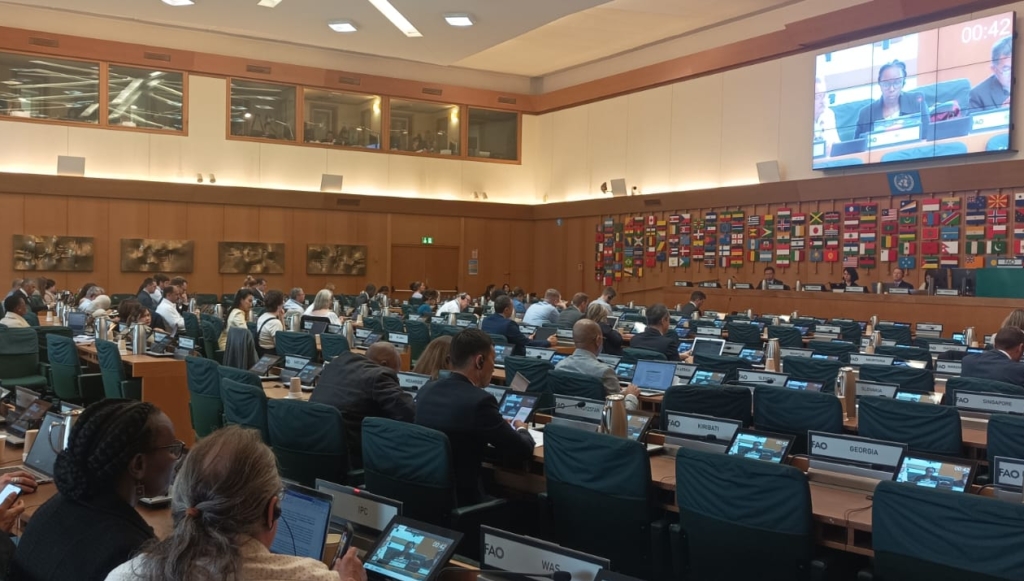June 3, 2025
In May 2025, an IPC delegation participated in the 13th session of the Sub-Committee on Aquaculture (COFI:AQ XIII). This session focused on shaping global aquaculture policy, particularly in relation to the Guidelines on Sustainable Aquaculture (GSA), endorsed by COFI in 2024. Under the umbrella of FAO’s Blue Transformation Roadmap (2022-2030), the GSA has rapidly become a central reference point for aquaculture policy, establishing principles and practices that should guide the process of sustainable intensification and expansion of aquaculture at the national level.
However, IPC raised concerns to Member States at COFI:AQ XIII, who reaffirmed the need for the development of industrial aquaculture for food security. Even if the newly adopted Guidelines include some elements that refers to the environmental sustainability of aquaculture, concerns remain on the impact to the social and economic situation of fishers’ communities and Indigenous Peoples.
Aquaculture is one of the fastest-growing food industry of the 21st century. According to SOFIA, 2024, global consumption of farmed fish has surpassed that of captured fish. At COFI:AQ XIII, countries appeared eager to invest in, expand or develop their aquaculture sector. The discussions included circular economy integration, alternative aquafeeds, private-public partnerships, collaboration between academia, states, investors and producers, and the promotion of co-management systems. Small-scale aquaculture was also acknowledged, particularly in relation to digitalization and access to finance for producers in developing countries.
Yet, fisherfolks and Indigenous Peoples’ movements know from experience that merely adding the word ‘sustainable’ to an export-oriented, profit-driven, environmentally- and socially-destructive industry, does not effectively make it sustainable. For the IPC Fisheries Working Group and its member organizations— namely the World Forum of Fish Harvesters and Fish Workers (WFF), the World Forum of Fisher Peoples (WFFP), the International Indian Treaty Council (IITC), and La Via Campesina (LVC)—these narratives are deeply concerning. The consensus reached at COFI:AQ XIII, which positions aquaculture as a solution to climate change, overfishing and food security, reflects the global tendency to prioritize profit-driven food industries over the livelihoods and Food Sovereignty of small-scale fishers and Indigenous Peoples.
Representing millions of small-scale fishers and Indigenous Peoples worldwide, the IPC Fisheries Working Group has consistently raised alarms over what it sees as the aggressive and unchecked expansion of industrial aquaculture under the guise of sustainability. The IPC has denounced the increasing influence of corporations and financial capital in aquaculture policy. In many cases, States have weakened national regulations to accommodate industrial growth, undermining the rights of coastal and inland communities. The consequences are grave: the displacement of peoples, erosion of customary tenure systems, denial of free, prior, and informed consent, increased poverty and marginalization, and ongoing human rights violations, all of which contradict the principles of the FAO-endorsed Voluntary Guidelines for Securing Sustainable Small-Scale Fisheries in the Context of Food Security and Poverty Eradication (SSF Guidelines).
IPC strongly opposes the industrial monoculture model of aquaculture, warning that it threatens marine and freshwater ecosystems. Pollution from fish farms—including antibiotics, pesticides, plastics, and carcinogenic substances—is linked to biodiversity loss, the creation of ocean dead zones, and serious risks to human health. These harmful effects were largely absent from the enthusiastic framing of aquaculture as a “circular economy” and “development” opportunity at COFI:AQ XIII. In these discussions, aquaculture was promoted as a win-win solution, promising that its development will increase profit and food security and uphold human rights.
We, the IPC Fisheries Working Group calls on governments to reverse these trends and take immediate steps to uphold human rights, protect customary tenure and collective rights, and prevent ecological degradation of marine and inland ecosystems. These demands are not new, they are aligned with the commitments FAO Member States made in 2014 when adopting the SSF Guidelines.
For this reason, the IPC has recently revitalized the structure of the SSF Global Strategic Framework (SSF-GSF), aimed at giving SSF right-holders the space to monitor and guide the implementation of the SSF Guidelines. Collaborating with governments to implement these Guidelines through National Plans of Action (NPOAs) is a crucial step to recognize the vital role of small-scale fisheries and Indigenous Peoples in ecosystem and biodiversity protection, while also defending human rights and promoting Food Sovereignty.
